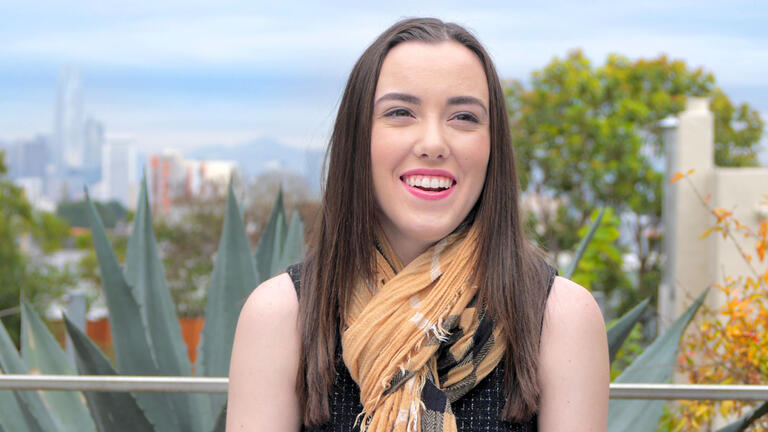
Pursuit of Knowledge
"Never stop learning" is a motto that Jessica Scarborough '16 lives by. In pursuing her MD and PhD in systems biology and bioinformatics, that motto will prove essential. After graduating USF with her bachelor's in biology, Jessica was accepted to Case Western Reserve, one of the nation's top research universities. She's pursuing her doctorate degrees there and researching as part of a medical scientist training program funded by the National Institutes of Health (NIH). Jessica credits her research opportunities at USF and the support of the faculty with inspiring her lifelong pursuit of knowledge.
How did the biology program help to prepare you for grad school?
There's an incredible number of faculty who helped cultivate my interest and inspired my decision to pursue research as an aspect of my future career. Professor Brian Thornton, my academic adviser, showed me what genuine excitement about the field looked like. His mentoring pushed me to do my best, but also encouraged me to take risks, even when they scared me.
Professor Juliet Spencer's guidance in my honors thesis helped me reach my first milestone as a future scientist, a published peer-reviewed journal article. She cared about my success enough to give me honest critiques, and I wouldn't be the student/scientist/future doctor that I am without her.
How did you first realize your passion for research and Bioinformatics?
During a seminar series within USF's biology curriculum, I heard Professor William Bosl from USF's Health Informatics program talk about his research using machine learning to predict autism before the observable onset of the disease. Despite having no experience in computational science, I was immediately excited about the subject and looked for ways to participate in his research.
With the help of the Biology program's flexibility, we rearranged my trajectory and I became the first biology student to complete a 4+1 program. Exactly one year after graduating from the Biology program, I graduated with a master's in health informatics. I was even able to complete my thesis research with Professor Bosl, who inspired my excitement for the field!
What's your fondest memory of the program?
Presenting my honors thesis in the seminar series course, just a year after I took it myself. This was the course that changed all my ambitions; it inspired me to do research in the first place. One year later, I stood in front of the auditorium and saw the faces of my friends, classmates, and professors who supported me along the way. At the time, it felt like any other day, but I'll never forget the feeling of support I felt during that presentation.
What would be your dream job?
After graduating from my MD/PhD program, I'll be applying for residency. I'm currently in the initial phase of medical school where every single topic we learn is new and exhilarating. Last week I wanted to focus on endocrinology, this week I'm interested in radiation oncology, and next week maybe it'll be neurosurgery!
One thing I'm confident about is that I will be using this PhD to do more than clinical research. One day, I'd like to run the informatics and data side of a hospital as a Chief Medical Officer (CMO). Until then, I'm going to learn everything there is to know about the science behind our clinical decision support tools and the art that goes into patient care.
How do you continue to carry on USF's Jesuit mission?
USF's Jesuit values mean approaching clinical care from the perspective of seeing the whole person. Each patient has a story, a set of circumstances, that brought them to where they are today, and I intend to keep this knowledge in mind with every patient encounter.
It's easy to become overwhelmed when we realize both how much we know and still don't know about the human body. The Jesuit mission asks that we are never ending learners. I want to approach each day as an opportunity to learn from and contribute to our understanding of medicine in order to make a lasting impact on the world, and the lives of my patients.


